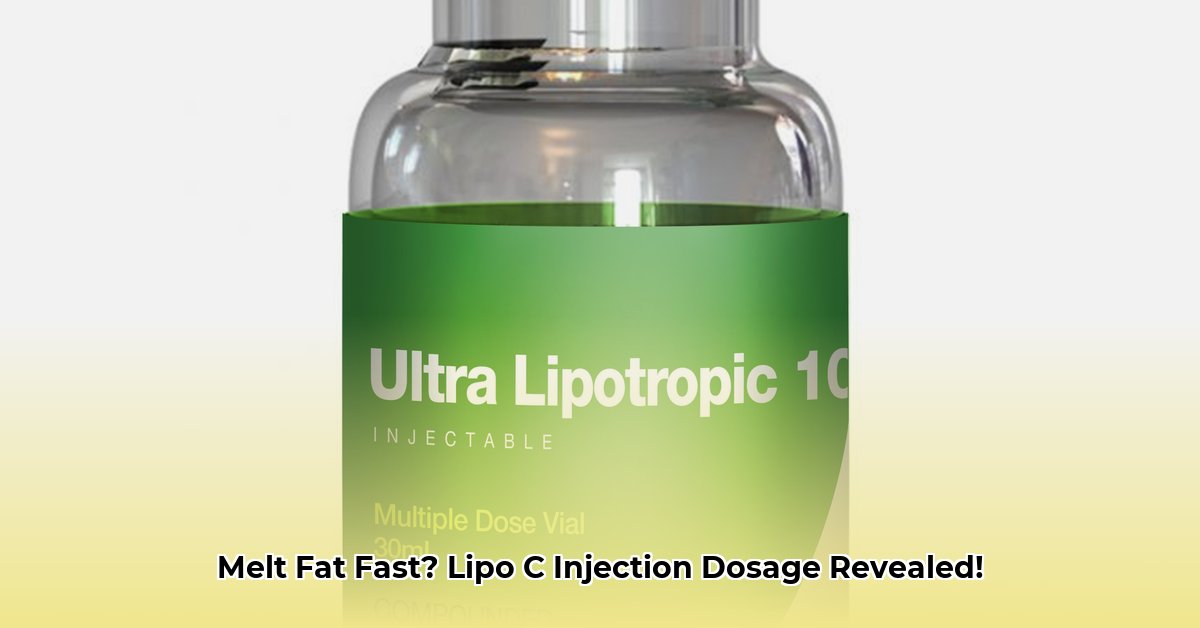
Understanding Lipo C Injections for Weight Loss
Lipo C injections, often marketed as a weight-loss solution, typically contain a blend of vitamins and nutrients such as choline, inositol, methionine, and B vitamins (particularly B12). These nutrients play various roles in the body, some of which are purported to influence fat metabolism and liver function. However, it's crucial to understand that the scientific evidence supporting their efficacy in weight loss is limited. Many observed weight changes might be attributed to concurrent lifestyle modifications, such as improved diet and increased exercise. How much weight loss can be directly attributed to the injections themselves remains largely unproven.
What's in a Lipo C Injection? The Ingredient Breakdown
A Lipo C injection is essentially a customized vitamin cocktail. The precise formulation varies significantly between clinics, creating a lack of standardization and potentially impacting both safety and efficacy. Common ingredients include:
- Choline: A nutrient vital for liver function and fat metabolism. (Its role in weight loss is debated.)
- Inositol: Another nutrient involved in several metabolic processes; its direct effects on weight loss are uncertain.
- Methionine: An essential amino acid implicated in fat breakdown. (Further research is needed to solidify its role in weight loss.)
- B Vitamins (especially B12): Essential for energy production and various metabolic processes. (While energy boosts can indirectly support weight management, they don't directly cause weight loss.)
The absence of a standardized formula necessitates careful consideration and thorough discussion with a healthcare provider before proceeding with these injections.
Lipo C Injection Dosage: A Critical Overview
Determining the appropriate Lipo C injection dosage is challenging due to the lack of regulated standards and established protocols. Dosage is typically determined on a case-by-case basis by healthcare professionals, taking into account individual factors such as weight, overall health, and the patient's response to the treatment. There is no universally accepted dosage guideline endorsed by major health organizations. This further underscores the importance of consultation with a medical professional.
FDA Regulation and Safety Concerns
A critical aspect to consider is the Food and Drug Administration's (FDA) lack of comprehensive regulation for lipotropic injections. This means the quality, purity, and consistency of ingredients may vary significantly between providers. This absence of stringent oversight increases the risk of inconsistent product quality and potential safety issues. Before undergoing Lipo C injections, thoroughly research the clinic and provider to ensure they adhere to high safety standards and ethical practices. Why is FDA regulation so important? Because it ensures consumer safety and protects against potentially harmful practices.
Potential Benefits and Risks: A Balanced Perspective
While some individuals report positive experiences with Lipo C injections, it's crucial to weigh the potential benefits against the associated risks.
Potential Upsides (Based on Limited Evidence):
- Improved Liver Function: Some studies suggest certain ingredients may support liver health. (Further investigation is necessary to confirm this benefit in relation to weight loss.)
- Increased Energy Levels: B vitamins, often included, contribute to energy production. (This indirect effect might improve adherence to diet and exercise plans.)
Potential Downsides:
- Injection Site Reactions: Pain, redness, and swelling at the injection site are common side effects.
- Allergic Reactions: Allergic reactions, although relatively uncommon, are possible. (Individuals with known allergies to the ingredients should avoid these injections entirely.)
- Lack of Regulation: The absence of standardized production and FDA oversight introduces significant safety and efficacy uncertainties.
Lipo C Injections: A Part of a Holistic Approach
It's paramount to understand that Lipo C injections are not a standalone solution for weight loss. They should be considered, if at all, only within the context of a comprehensive weight management plan that integrates the following:
- Balanced Diet: A nutritionally sound diet is fundamental for sustainable weight loss and overall health.
- Regular Exercise: Physical activity contributes to calorie expenditure and overall well-being.
- Adequate Sleep: Sufficient sleep is crucial for metabolic regulation and hormone balance.
- Stress Management: Chronic stress can negatively impact metabolism and weight management.
How Effective Are Lipo C Injections Compared to Other Methods?
Compared to established weight loss methods, the effectiveness of Lipo C injections is considerably less certain. Dieting and exercise remain the cornerstones of successful, long-term weight management. Medically supervised weight-loss programs, which offer personalized guidance and support, show greater efficacy and safety. The lack of substantial scientific evidence supporting Lipo C injections makes them a less reliable option as compared to these proven methodologies. Are lipotropic injections a worthwhile investment for weight loss? Current research suggests other proven weight loss strategies are more effective and safer.
Making an Informed Decision
Before considering Lipo C injections, schedule a consultation with your physician or a registered dietitian. They can assess your health status, discuss potential risks and benefits specific to your case, and help you determine the most appropriate weight loss strategy. Never commence any new treatment regimen without first seeking professional medical advice. Remember, sustainable weight loss requires a comprehensive approach that addresses diet, exercise, stress management, and sleep hygiene. Lipo C injections, if considered at all, are merely a supplemental – and largely unproven – component of this holistic strategy.